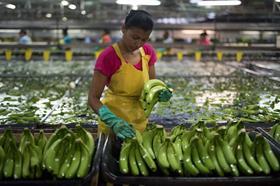
Banana producers are increasing their use of voluntary sustainability standards (VSSs) in order to tackle the main sustainability challenges affecting the sector, according to a report from the International Institute for Sustainable Development (IISD).
Such challenges include crop diseases, impacts from climate change, excessive pesticide use, low farm-gate prices and poor labour practices.
“With standards such as Rainforest Alliance, Organic and Fairtrade, banana plantations are more likely to do things like fairly compensate workers and reduce pesticide use and water depletion,” said Vivek Voora, one of the report's authors and an associate with IISD.
According to the report, VSS use in the sector saw a 43 per cent compound annual growth rate (CAGR) from 2008 to 2016, compared with a 0.71 per cent CAGR for conventional bananas.
By 2016, it revealed, at least 7 per cent of global banana production was certified by a VSS, representing 36 per cent of exported bananas.
“Consumers in North America and Europe are demanding healthier and more sustainable bananas in the marketplace,” said Voora.
The report stressed that, unlike other commodity markets, VSS-compliant bananas tended to be sold as such.
Driven by demand from producer countries in the developing world, including India, China and the Philippines, overall banana consumption is estimated to reach 136m tonnes by 2025, an increase of 20m tonnes from 2017.
The Asia-Pacific region, which accounts for 61 per cent of the present demand, is expected to lead this growth. Voora said that the massive Asia-Pacific market had huge potential to push the sector towards sustainability if demand for VSS-compliant bananas could be developed there.
“It’s critical for VSSs to become more accessible so smallholder producers can easily adopt the standards, and consumers in developing countries can afford to buy them,” he said.



